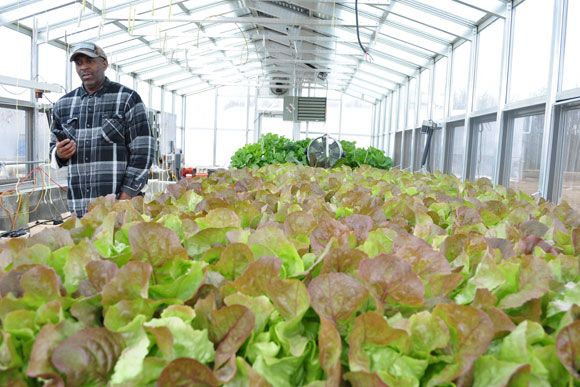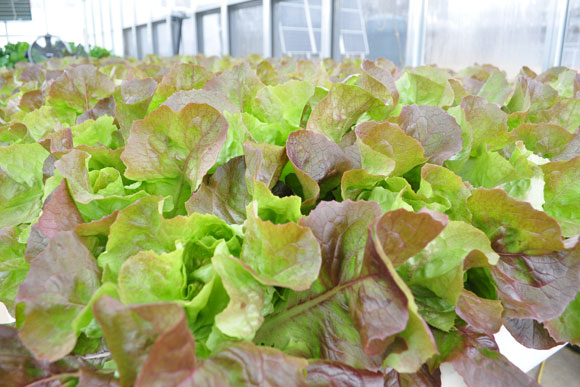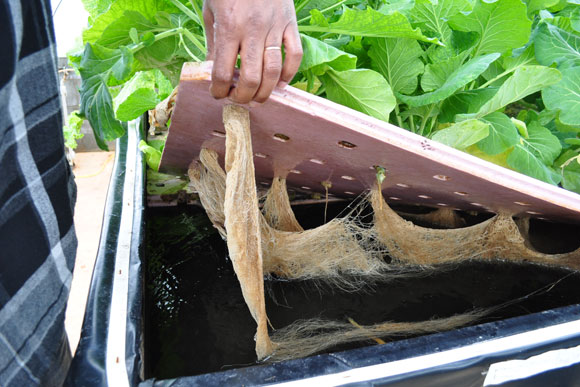On a January morning, Mchezaji “Che” Axum stepped around iced-over puddles to reach a row of heated hoop houses where Asian mustard greens still leafed knee-high. Here at the Muirkirk Research Farm run by the University of the District of Columbia, these tightly spaced greens are grown for optimal space, taste — these were as spicy as horseradish — and nutrition.
“One of the things I’m really concentrated on is nutrient density of crops,” says Axum, who runs the farm in Beltsville, Md., as director of the Center for Urban Agriculture and Gardening Education in the College of Agriculture Urban Sustainability and Environmental Sciences (CAUSES) at UDC.
When feeding large numbers of people from limited spaces — the essence of urban farming and of feeding the city’s hungry — nutrient density matters. Much of the food grown on the 143-acre farm goes to nonprofits like Bread for the City, which helps run an orchard here, and DC Central Kitchen; nonprofits received nearly 1,000 pounds of produce from the farm in 2013.
But, as of this year, more of the produce will be sold at UDC’s campus cafeteria as well as its farmers market — and it will be used to educate a growing number of urban farmers and gardeners along the way.
UDC is the only land-grant university, — created to provide agricultural and other practical training to the public — in the country with an exclusively urban focus (there aren’t any rural areas in the District). It’s also the only public university in the city. As such, UDC is uniquely positioned to provide the research and technical support that other urban farmers need.
UDC offers many of the same programs as the extension service branches of other universities, enrolling about 60 people this winter in its popular
Master Gardeners Program.
The difference, says Axum, is “it’s not retired people. It’s mostly young, urban professionals.”

“It’s clear that urban settings, given how many people live in them, still have an important role to play in food security and production,” says Sabine O’Hara, dean of UDC’s CAUSES and director of its land-grant programs.
The university offers a 10-week urban agriculture certificate program that is beginning to fill the educational gap for those interested in farming small spaces, but O’Hara says that’s just the beginning. The Beltsville farm has been transformed since she first came on in 2012, cultivating additional acreage into a growing resource for urban farmers and food system innovators.
A legacy of urban ag
Axum’s great-great grandfathers both farmed land in and around Washington, but he wasn’t looking to follow in their footsteps. He was going to pharmacy school when he happened upon a USDA research facility just beyond the Beltway. He pulled over, popped in and asked about a job. The USDA hired him to research gypsy moths just before instituting a hiring freeze.
“I didn’t know anything about agriculture,” says Axum, now 58.
He went on from the USDA to get a degree in agronomy, which applies crop and soil science to food production, from the University of Maryland. Before coming to UDC’s farm, he spent 20 years teaching middle school science at one of the most challenging schools in the District, Options Public Charter School, always growing food on the side.
One of Axum’s great-great grandfathers also taught school in Northeast Washington and farmed in the summers; the other sold vegetables, chickens and moonshine off his Mitchellville, Md., farm.
“By the time I knew him,” Axum says, “he had moved into the city and was growing grapes and vegetables in his backyard.”
While working other jobs, Axum leased land to run a small farm in Upper Marlboro for nearly six years, “and then one day, they decided to sell and I had to move on,” he says. “That was a tough break up.”
Axum says he understands when this happens to urban farmers. While
recent legislation in the District aims to chip away at unaffordable taxes for farmers, the obstacles against running a farm business in the District, such as unreliable access to land and zoning issues, are still formidable. Which is one of the reasons why UDC's farm is located half an hour away from campus in Beltsville.

That lack of land often limits
urban farmers to smaller operations, which don't lend themselves to profitability. “Growing and giving away is one thing,” he says. “But when you have to grow and take stuff to a market or a restaurant and it has to be almost picture-perfect, that’s a whole different ball game.”
Programs
Even in January, the relatively small farm — less than 15 acres of the land is currently used to grow food — serves as a research playground for those interested in what urban agriculture can grow.
A field near the entrance showed the remnants of a dry-land rice-growing project that used sub-surface irrigation. Axum worked with Purple Mountain Organic, a garden and farm supply shop in Takoma Park, on the project, which he says produced the “best rice I ever tasted.”
With intensive weed management, Axum says growing rice on small plots of land could be well suited to an urban setting.
He used fish waste from an aquaponics experiment to fertilize the rice, running a hose from the greenhouse where some 500 tilapia grew in two open-air tanks. The relatively small tanks could hold that many fish thanks to an oxygen-infusing device invented by one of UDC’s environmental sciences professors.
The farm also has benefitted from the work of engineering students who built solar panels to run its well and environmental sciences students who conduct water quality experiments at the farm.

Axum says it’s not as easy to get students to participate in the farm, because it’s not located as close to campus as, for example, the University of Maryland’s Terp Farm.
In addition, “most of our students don’t live on campus either. They work full-time or part-time jobs, so it’s more of a challenge trying to integrate them into the farm,” he says.
Axum is hopeful that the more students know about the farm — through eating its produce on campus or attending special events — the more they’ll want to get involved.
He has plans to turn an empty shipping container sitting at the edge of the farm into a demonstration of urban farming techniques, which could include growing fish for food and fertilizer.
Perhaps, eventually, he’ll be able to take the farm to them.